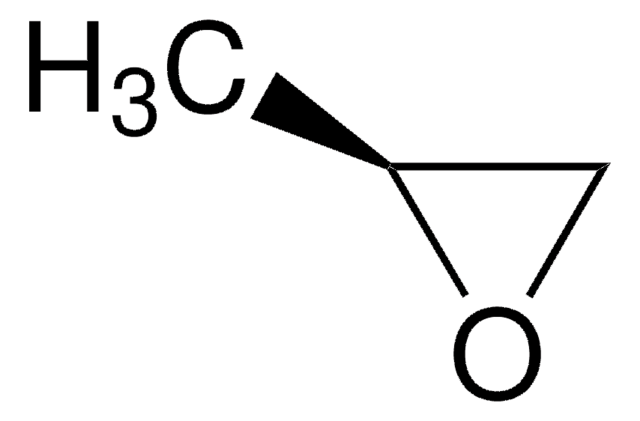8.07027
1,2-Propylene oxide
for synthesis
Synonym(s):
1,2-Propylene oxide, 1,2-Epoxypropane, Methyloxirane
About This Item
Recommended Products
vapor pressure
585 hPa ( 20 °C)
Quality Level
Assay
≥99.0% (GC)
form
liquid
autoignition temp.
430 °C
potency
380 mg/kg LD50, oral (Rat)
1245 mg/kg LD50, skin (Rabbit)
expl. lim.
1.9-36 % (v/v)
reaction suitability
reaction type: C-C Bond Formation
kinematic viscosity
0.37 cSt(20 °C)
mp
-112 °C
transition temp
flash point -38 °C
density
0.83 g/cm3 at 20 °C
InChI
1S/C3H6O/c1-3-2-4-3/h3H,2H2,1H3
InChI key
GOOHAUXETOMSMM-UHFFFAOYSA-N
Application
- Enhanced poly(propylene carbonate) synthesis: Enhanced poly(propylene carbonate) materials were developed through a one-pot synthesis from carbon dioxide, propylene oxide, and a carboxylic dianhydride, showing significant improvements in yield strength when the feed molar ratio of dianhydride to propylene oxide was increased (X Chen et al., 2018).
- Copolymerization with carbon dioxide: A study on the copolymerization and terpolymerization of carbon dioxide/propylene oxide/phthalic anhydride using a cobalt salen complex demonstrated efficient synthesis without forming ether linkages (JY Jeon et al., 2014).
- Polymer architectures: Innovative polymer architectures were explored in the synthesis of poly(ethylene oxide), propylene oxide, and other alkylene oxides, which include novel bioconjugation techniques (J Herzberger et al., 2016).
Analysis Note
Density (d 20 °C/ 4 °C): 0.828 - 0.832
Identity (IR): passes test
Signal Word
Danger
Hazard Statements
Precautionary Statements
Hazard Classifications
Acute Tox. 3 Dermal - Acute Tox. 3 Inhalation - Acute Tox. 4 Oral - Carc. 1B - Eye Irrit. 2 - Flam. Liq. 1 - Muta. 1B - STOT SE 3
Target Organs
Respiratory system
Storage Class Code
3 - Flammable liquids
WGK
WGK 3
Flash Point(F)
-36.4 °F - Equilibrium method
Flash Point(C)
-38 °C - Equilibrium method
Certificates of Analysis (COA)
Search for Certificates of Analysis (COA) by entering the products Lot/Batch Number. Lot and Batch Numbers can be found on a product’s label following the words ‘Lot’ or ‘Batch’.
Already Own This Product?
Find documentation for the products that you have recently purchased in the Document Library.
Customers Also Viewed
Our team of scientists has experience in all areas of research including Life Science, Material Science, Chemical Synthesis, Chromatography, Analytical and many others.
Contact Technical Service












